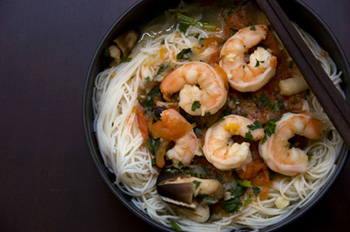It's easy to get answers about health and nutrition! Just send your question by email to [email protected] and Dr. Harlan will respond to selected questions of general interest. Answers will be posted in the Ask Dr. Gourmet newsletter (sign up now!) and archived in the Ask Dr. Gourmet section of the website.
Please note that the Ask Dr. Gourmet feature is restricted to questions regarding food and nutrition. Due to the many questions we receive, not all questions may be answered. For more specific questions about your individual health, please contact your doctor. About Timothy S. Harlan, MD, FACP, CCMS | Terms of Use | Privacy Policy
Ask Dr. Gourmet
Two related questions from two different readers:
1. Can I take the PGX or PolyGlycopleX, a water soluble plant fibre, along with my Coumadin (warfarin)?
2. I've been checking the internet for some low-fat crock pot recipes, and one website kept mentioning Miracle Noodles. Have you ever heard of them? They seem harmless enough, so I thought I might try some, but I wanted to check with you first.
Dr. Gourmet Says...

This is not the first time that I have been asked about these products. In addition to many brand names, such as PGX and PolyGlycoplex, you'll also find a related product that folks eat, Glucomannan. This is a calorie free starch that's generally used as a thickener, as well as in a host of nutritional supplements, but is also made into calorie free noodles such as the Miracle Noodles.
Basically these products are made of a long chain of sugars (polysaccharides) that your body can't break down, so it passes right through unabsorbed. There's been some research using it in pill form, where it makes folks feel full and they eat less, but this has not been well researched in large studies. It's not been well tested but is pretty widely available in the unregulated supplement market. I have seen these noodles but I haven't tried the product and I'm not sure I would. Sounds a bit like eating Elmer's glue - it's the same sort of polysaccharide.
As such I would suggest avoiding this if you are taking Coumadin® (warfarin).
Here's what the FDA has to say on Weighing the Claims in Diet Ads.
Keep in mind that low fat is NOT a good diet. We know that moderate fat and a focus on great quality fats is the key to a healthy diet. The best evidence we have says about 35% - 40% fat with high monounsaturated fats, 50% high quality complex carbohydrates and moderate protein is the key. Don't eat too little fat. It's clearly bad for you to limit fat.
Thanks for writing,
Timothy S. Harlan, MD, FACP, CCMS
Dr. Gourmet
